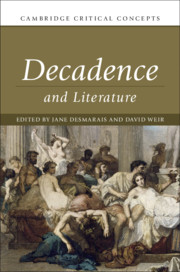Book contents
- Decadence and Literature
- Cambridge Critical Concepts
- Decadence and Literature
- Copyright page
- Dedication
- Contents
- Figures
- Contributors
- Acknowledgements
- Introduction
- Part I Origins
- Part II Developments
- Part III Applications
- Chapter 16 Decadence and Urban Geography
- Chapter 17 Socio-aesthetic Histories: Vienna 1900 and Weimar Berlin
- Chapter 18 Decadence and Cinema
- Chapter 19 Transnational Decadence
- Chapter 20 Decadence and Modernism
- Chapter 21 Modern Prophetic Poetry and the Decadence of Empires: From Kipling to Auden
- Chapter 22 The Gender of Decadence: Paris-Lesbos from the Fin de Siècle to the Interwar Era
- Chapter 23 Decadence and Popular Culture
- Select Bibliography
- Index
- References
Chapter 19 - Transnational Decadence
from Part III - Applications
Published online by Cambridge University Press: 12 August 2019
- Decadence and Literature
- Cambridge Critical Concepts
- Decadence and Literature
- Copyright page
- Dedication
- Contents
- Figures
- Contributors
- Acknowledgements
- Introduction
- Part I Origins
- Part II Developments
- Part III Applications
- Chapter 16 Decadence and Urban Geography
- Chapter 17 Socio-aesthetic Histories: Vienna 1900 and Weimar Berlin
- Chapter 18 Decadence and Cinema
- Chapter 19 Transnational Decadence
- Chapter 20 Decadence and Modernism
- Chapter 21 Modern Prophetic Poetry and the Decadence of Empires: From Kipling to Auden
- Chapter 22 The Gender of Decadence: Paris-Lesbos from the Fin de Siècle to the Interwar Era
- Chapter 23 Decadence and Popular Culture
- Select Bibliography
- Index
- References
Summary
Arthur Symons’s ‘The Decadent Movement in Literature’ (1893) introduced decadence to English readers by insisting that decadence should be seen as ‘[t]he latest movement in European literature’, rejecting the proposition that decadence might have any exclusively national affiliation. Authors associated with decadence are ‘transnational’ in the sense that they responded to the challenges of working in a space that simultaneously ranged across nations and reached beyond the nation as an ideologically constructed marker of identity. This transnational re-orientation affected the decadents’ taste, modes of production, and individual identities. In short, decadents were aware of inhabiting a transnational field, and they knew that this very awareness formed a key constitutive element of their notoriously slippery shared identity. Indeed, the act of questioning national identity and national feeling was an important part of the decadents’ ethos of transgression. The transnational impulse was thus intimately related to decadent modes of dissent from the bourgeois habitus and sexual morality, as well as from traditionalist requirements of conventional literature.
Information
- Type
- Chapter
- Information
- Decadence and Literature , pp. 316 - 331Publisher: Cambridge University PressPrint publication year: 2019
References
Accessibility standard: Unknown
Why this information is here
This section outlines the accessibility features of this content - including support for screen readers, full keyboard navigation and high-contrast display options. This may not be relevant for you.Accessibility Information
- 3
- Cited by
